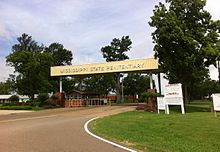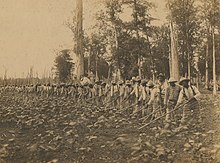Mississippi State Penitentiary
The Mississippi State Penitentiary , also known as "Parchman Farm" , is the oldest and largest detention center and the only maximum security prison in the US state of Mississippi . It is located in the Mississippi Delta in Parchman , Sunflower County, and is run by the Mississippi Department of Corrections , the Mississippi State Penitentiary Service.
The prison
The penitentiary was established in 1904 by Governor James K. Vardaman to end the leasing of prisoners . It was set up to make a profit for the state, first by selling the wood in the cleared area of Parchman, and later by selling the cotton grown there and harvested by hand . This system was further perfected from the 1940s under prison superintendent Marvin Wiggins.
The institution offers space for a total of 4840 prisoners (men and women), including those sentenced to death by the state. The prisoners are required to work in the fields of the 73 km² prison farm or in internal workshops. The working conditions were extremely strict; the prison's reputation was similar to that of Alcatraz and Sing Sing . It wasn't until the early 1970s that a series of federal court rulings led to the dismantling of the forced labor system and more humane conditions of detention.
Prominent inmates included the radical civil rights activist Stokely Carmichael and the radical Ku Klux Klan leader Sam Bowers , who ordered lynching of civil rights activists. Vernon Presley, father of Elvis Presley , was imprisoned here for check fraud from May 1938 to February 1939 .
death penalty
In addition, executions are carried out inside the prison , until 1954 on the electric chair , today with lethal injection . Furthermore, after the US Supreme Court ruled that the nationwide suspended death sentences were constitutional in 1976 , Edward Earl Johnson and his lawyers were sentenced to death in the 1987 Mississippi State Penitentiary in the documentary Fourteen Days in May in the last two weeks before his execution Paul Hamann and his film crew accompanied him, always with the hope of postponing execution and converting it to life imprisonment , which in the end did not materialize.
Already strapped in the gas chamber, Edward Earl Johnson protested his innocence. Even before, but especially after his execution on May 20, 1987, there were massive doubts about his guilt for shooting a police officer. The documentary also addresses the issue of “colored criminals vs. white criminals ”, as the percentage of the latter are much less likely to be sentenced to death.
Others
The novel Die Kammer by John Grisham is set for the most part in the Mississippi State Prison, the film adaptation of the book was partly also recorded in this original location.
Parchman Farm also plays a role in the history of the blues . Various well-known blues musicians were imprisoned here, including Bukka White (who wrote the Parchman Farm Blues and When Can I Change My Clothes there ) and Son House . In 1939, blues researcher Alan Lomax made recordings with White and other inmates on Parchman Farm. The documented work songs survived there due to the strong isolation of the prison. The Parchment Farm Blues later became the Standard Parchman Farm . Further recordings were made in the detention center in the late 1940s and later released as the album Negro Prison Songs in 1957 on Tradition Records or on CD in an expanded version as Prison Songs: Historial Recordings from Parchman Farm 1947-48 by Rounder Records .
Some scenes from the film O Brother, Where Art Thou? - A Mississippi Odyssey by Joel and Ethan Coen set on the "Parchman Farm"; for the music, the Gospel Po Lazarus was used, which Alan Lomax had recorded there in 1959.
literature
- William Banks Taylor Down on Parchman Farm: The Great Prison in the Mississippi Delta Columbus: Ohio State University Press 1999; ISBN 978-0814250235
Web links
- Official website ( September 5, 2014 memento in the Internet Archive ) on the Mississippi Department of Corrections website. (English)
Individual evidence
- ↑ a b c The 50 Craziest Prisons and Jails in the World
- ↑ Fourteen Days in May in the Internet Movie Database (English)
- ↑ Review (topdocumentaryfilms.com)
- ↑ a b Parchman Farm - The Mississippi Blues Trail
- ↑ cf. Prison Songs, Vol. 1: Murderous Home on Allmusic (English) and Prison Songs, Vol. 2: Don't cha Hear Poor Mother Calling on Allmusic (English)
Coordinates: 33 ° 55 ′ 45.9 ″ N , 90 ° 33 ′ 9.9 ″ W.


